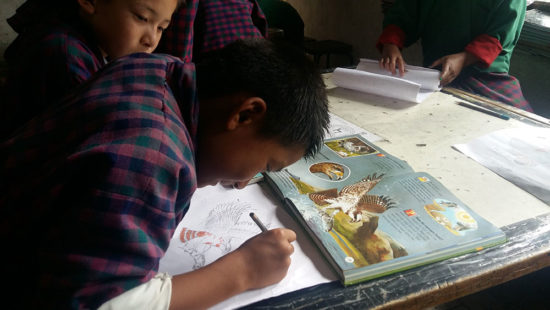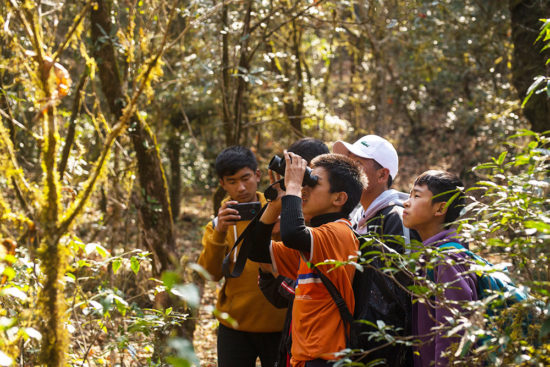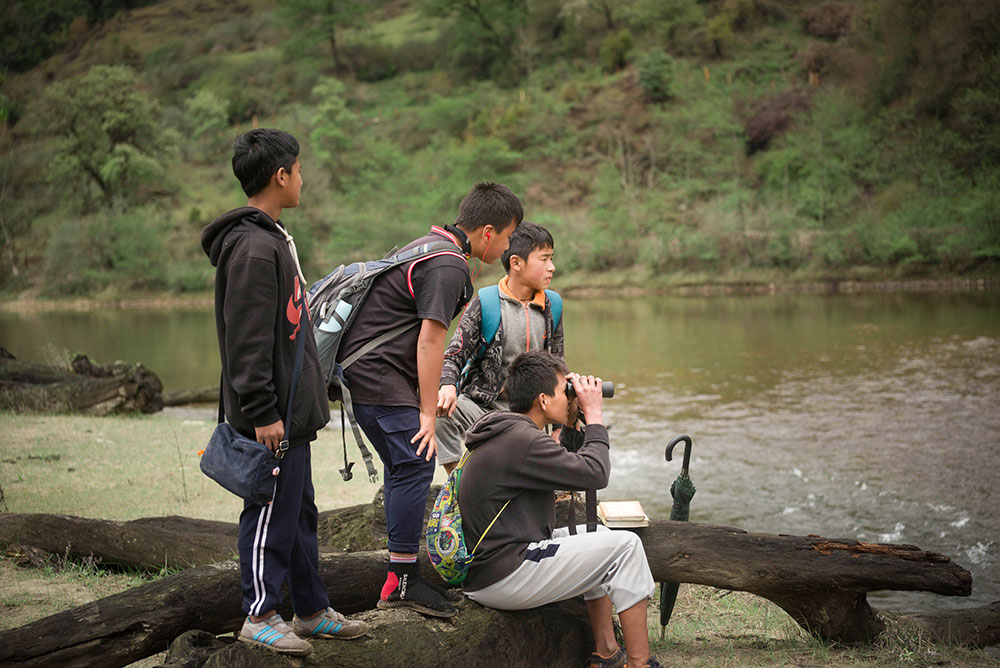A story of one binocular, 60 young budding birdwatchers and over 315 species of birds in the wilderness of Trashiyangtse
According to social psychology when people experience a memorable natural encounter as a child, that experience can reawaken in the adult. It is also scientifically proven that people who got outdoors and enjoyed nature as a child tend to be more environmentally responsible.
As an educator, a nature-lover and an aspiring birdwatcher, I believe birdwatching has the potential to influence how children think, understand and act toward their immediate living environment. It can be a doorway to let the children develop the right attitudes, mindfulness and practices towards the natural world at an early age. I also strongly believe that a small initiative like birdwatching club in the schools can provide an engaging theme for a whole host of cross-curricular activities including language, science, mathematics, and technology. Of all, it can teach children a life-long lessons on the values of the interdependence or coexistence of all life forms: human or wildlife.
Further, this adheres to the principle of environmental conservation chartered in the developmental framework, GNH. Bhutanese children are growing up to learn that our nation is indebted to our environmental policies envisioned by the succession of visionary kings to ensure our environment remain pristine for all generations. We embrace the value and conviction of a healthy planet for all sentient beings. As the leader of a global conservation initiative and the first carbon-negative nation in the world, we are required to take this action. The enormous international responsibility of maintaining this stellar reputation and acting compassionately and sincerely for the sake of safeguarding our shared planet is what Bhutan’s future upholds.
The Nature-Birdwatchers’ Club of Trashiyangtse LSS
As we have learned that birdwatching can be a progressive activity to let children appreciate nature for personal and social well-being towards nature, we started a Nature-Birdwatchers’ Club in our school. This humble club in Trashiyangtse Lower Secondary School has 60 members from classes 4 to 8, comprising 25 girls and 35 boys which we consider as the largest club in our school.

A class 3 student drawing Osprey

Birdwatching group of Trashiyangtse LSS
Till 2020, the club functioned as School Nature Club with help from Royal Society for Protection of Nature (RSPN) in providing guidebooks, newsletters, card games, DVDs of documentaries of Black-necked Cranes, and other significant RSPN publications. In the beginning of 2022, our well-wishers Tshultrim and Thinley Wangchuk donated a few copies of their book titled “A Pictorial Field Guide to Birds and Butterflies of Bhutan”. However, our club has only one pair of binoculars for field use purchased by the club coordinator.
Despite the lack of professional birding gears, the members of the birdwatching club have never been discouraged but have shown a fervent interest in exploring and learning about birds and the natural world around us here in Trashiyangtse valley. What keeps motivating the birding club members is that we may have only one binocular but we have over 315 species of birds to discover in Trashiyangtse. We also have globally endangered species like the Black-necked Cranes and also the national butterfly found here. Our club members love and are fascinated by wild ducks, kingfisher and Black-necked Cranes. They like eagles too.
Our main objectives for forming the club are to create environmentally conscious students and to encourage birdwatching among students at a very young age. We also try to help students learn about bird species, distribution, and their habitats. We hope our students acquire skills needed to identify, investigate, and contribute to the resolution of nature conservation in future.
Some scientific research has shown that birdwatching can also help children with their mental health issues and foster a lifelong connection to nature. This beneficial bond with nature often deepens as individuals mature. Additionally, birding helps children strengthen their powers of observation and attention to detail. Children fundamentally learn to look from an aesthetic standpoint.
There are a thousand benefits of birding in general.
I would like to end my article with these emphatic words of Thomas Lovejoy, a biologist also known as the Godfather of Biodiversity, “If you take care of birds, you take care of most of the environmental problems of the world.”
Tandin Wangdi is a teacher at Trashiyangtse LSS. Besides his teaching job, he loves to promote nature, conservation and protection through working with students and the community. He also blogs at connectingyouthwithnature.blogspot.com which he started after being motivated by reading his students’ blogs. To know more about the club, you can write to him at nidnat.619@gmail.com

This series is sponsored by Ecotourism Project “Mainstreaming Biodiversity Conservation into the Tourism Sector in Bhutan” funded by GEF-UNDP through Tourism Council of Bhutan, RGoB.


